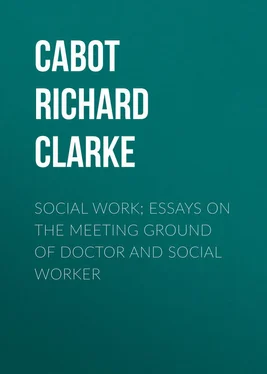Richard Cabot - Social Work; Essays on the Meeting Ground of Doctor and Social Worker
Здесь есть возможность читать онлайн «Richard Cabot - Social Work; Essays on the Meeting Ground of Doctor and Social Worker» — ознакомительный отрывок электронной книги совершенно бесплатно, а после прочтения отрывка купить полную версию. В некоторых случаях можно слушать аудио, скачать через торрент в формате fb2 и присутствует краткое содержание. Жанр: foreign_antique, foreign_prose, на английском языке. Описание произведения, (предисловие) а так же отзывы посетителей доступны на портале библиотеки ЛибКат.
- Название:Social Work; Essays on the Meeting Ground of Doctor and Social Worker
- Автор:
- Жанр:
- Год:неизвестен
- ISBN:нет данных
- Рейтинг книги:3 / 5. Голосов: 1
-
Избранное:Добавить в избранное
- Отзывы:
-
Ваша оценка:
- 60
- 1
- 2
- 3
- 4
- 5
Social Work; Essays on the Meeting Ground of Doctor and Social Worker: краткое содержание, описание и аннотация
Предлагаем к чтению аннотацию, описание, краткое содержание или предисловие (зависит от того, что написал сам автор книги «Social Work; Essays on the Meeting Ground of Doctor and Social Worker»). Если вы не нашли необходимую информацию о книге — напишите в комментариях, мы постараемся отыскать её.
Social Work; Essays on the Meeting Ground of Doctor and Social Worker — читать онлайн ознакомительный отрывок
Ниже представлен текст книги, разбитый по страницам. Система сохранения места последней прочитанной страницы, позволяет с удобством читать онлайн бесплатно книгу «Social Work; Essays on the Meeting Ground of Doctor and Social Worker», без необходимости каждый раз заново искать на чём Вы остановились. Поставьте закладку, и сможете в любой момент перейти на страницу, на которой закончили чтение.
Интервал:
Закладка:
A knowledge of prognosis will help the home visitor greatly in the solution of such problems. But it must be added that such knowledge as she already possesses about the prognosis of a disease, such as tuberculosis or heart trouble or kidney trouble, must always be supplemented by all the information that she can gain from the doctor as to the present prognosis in the case of the particular patient with whom the social worker has to deal. For the general prognosis of a disease is greatly modified by the particular circumstances in each individual case.
Physicians are not at all eager to impart their knowledge about prognosis, because this knowledge is so limited and so faulty. No scientific man likes to make definite statements upon so indefinite and hazy a matter as prognosis. Nevertheless, it is essential for the patient's good that the doctor should be asked to give her as clear and definite a statement as is possible for him to make with the facts that he possesses. For it is only upon the basis of such a statement that an intelligent plan of social treatment can be constructed.
Besides acquiring all that she can learn of the causes and prognosis of disease, the social worker should be familiar with the symptoms of the more important and common types of disease . There are now several books written particularly with the object of conveying to social workers and others such knowledge as I have referred to, yet without any pretence of equipping the person either for nursing or for the practice of medicine. I will mention here a book by Dr. Roger I. Lee, Professor of Hygiene in Harvard University, "Health and Disease: Their Determining Factors" (Little, Brown & Co., Boston, 1917), and my own book, "The Layman's Handbook of Medicine" (Houghton Mifflin Co., Boston, 1916).
In order to understand such books, and to arrange her knowledge of disease in such form that it may be easily handled, the social worker must have a slight knowledge of anatomy and physiology, so that she can arrange the symptoms of disease in connection with the different systems of organs: circulatory, digestive, respiratory, urinary, nervous, and locomotive.
Finally, the social worker must know the principles of hygiene , in order that she may effectively combat medical quackery and the prevalent medical superstitions of the people. That portion of hygiene which is both securely founded upon scientific evidence and useful in the preservation of health, makes up only a very small body of knowledge, so that it can be easily mastered by any intelligent person. Our knowledge upon such matters as diet, exercise, bathing, sleep, ventilation, when such knowledge is both scientific and practically useful, could be written upon a very few pages. It consists largely of negatives which contradict the current superstitions.
In my own work in this field I have found it essential that there should be no mystery and concealment, no obscurantism and mediæval Latin in the methods of treatment which the social worker explains or carries out under the doctor's directions. She must be able to deal with the patients frankly, openly, without concealment or prevarication. Otherwise she will not have moral force enough behind her statements to bring them home to the patient so as to secure any reform in his hygienic habits. Such reforms are difficult enough in any case. They are usually impossible unless they can be initiated by one rendered eloquent and convincing by the consciousness that she leans upon the truth and has nothing to conceal. If she has mental reservations, if she is trying to protect the authority of the physician in a statement which she does not believe to be wholly true, the force of her appeal will be so weakened that it will probably be ineffective.
There are some technical processes of diagnosis and treatment which are usually carried out by the visiting nurse, but which may well be performed after a brief training by the social worker who is not a nurse. Among these are:
(1) The accurate reading of the patient's temperature, pulse, and respiration, which she must often teach the patient to do for himself and to record accurately and clearly. This is of especial importance in tuberculosis, for in suspected cases of this disease one often needs daily measurements of the temperature as an aid in determining the diagnosis or in estimating the severity of the case and the fitness of the patient for work.
(2) The arrangement of a window tent or some other device for insuring the maximum of fresh air for the tuberculous patient both day and night. This device is also useful in pneumonia, typhoid fever, and other diseases, in case they are to be cared for at home and not in a hospital.
(3) The application of simple dressings to wounds, abscesses, and common skin diseases such as eczema, and impetigo.
(4) The care of the skin in bedridden patients. Our primary object here is the prevention of bedsores, those ulcerations which occur in very emaciated patients at the points where their weight presses a bone against the bedclothes.
(5) The simpler procedures for the preparation of milk for sick children and of other foods commonly advised for patients who are confined to bed.
(6) The methods of emptying the lower bowel by means of an enema.
Into the details of these procedures this is not the place to enter, but I wish specially to assert that all of them may be learned within a few weeks by persons who have not studied medicine or had the full course for the training of a nurse. Any one who possesses these simple bits of skill can do all that is necessary for the physical care of the sick poor in their homes, unless continuous attendance upon the patient is necessary. Such attendance is not within the province of the social worker. But in the technical procedures just described it is all the more important that she be expert, because such skill makes her a welcome visitor and a trusted adviser outside the field of medicine. Because she has given relief by dressing a wound, curing a skin disease, or applying a poultice, she will be listened to with liking and with confidence when, later, she comes to give advice in economic, educational, or moral difficulties.
CHAPTER II
HISTORY-TAKING BY THE SOCIAL ASSISTANT
History-taking concerns the social assistant especially because history-taking is one of the things one does, if one is wise, in any matter in which one is trying to help a human being. Even if you were concerned to help not a stranger, but a member of your own family, still you would need a story or history of the person's life whether you wrote it down or not.
In our attempts to be of use to people in their misfortunes, there are two very common and quite opposite points of view (roughly the right and the wrong), which I call ( a ) the "historic" and ( b ) the "catastrophic," the accidental, or the emergency point of view.
Confronted with people's troubles, whether physical or mental or spiritual, we are tempted, and above all they are tempted to regard the sickness, the poverty, or the sorrow in the light of an emergency, an accident, and therefore as something to be treated at once and by means which have little to do with the past and the future. On the other hand, the standpoint of science and philosophy, and of any one who has labored long in the field of social work with or without science or philosophy, is the point of view of history. This is the habit of mind which makes us believe that a supposed "accident" belongs in a long sequence, a long chain of events, so that it is impossible to understand or to help it without knowledge, as extensive as our time and our wisdom will allow, of that whole chain.
Consider a few examples which contrast these two points of view. When a boy is brought into court for stealing, it is almost always his attempt, and the attempt of those who defend him, to show that such a thing has never happened in his life before; he "just happened to steal." But as we inquire more closely into the facts, we almost always find that this is a fundamentally untrue statement of the case. For the offence which brought him into court is almost never the first offence. He has always stolen before. On the present occasion he was a member of a boy's gang; it was not in the least accidental that he got into that group of boys. As we search back in his history, and perhaps into his father's history, we find reasons why he is what he is now. Again, we are trying to help some wayward girl who has taken an immoral step. We are told what a wholly unforeseeable accident it was that got her into her trouble. But if we can get a good picture of her past, we find that we could have traced the tendency to weakness of this kind from the time she was born.
Читать дальшеИнтервал:
Закладка:
Похожие книги на «Social Work; Essays on the Meeting Ground of Doctor and Social Worker»
Представляем Вашему вниманию похожие книги на «Social Work; Essays on the Meeting Ground of Doctor and Social Worker» списком для выбора. Мы отобрали схожую по названию и смыслу литературу в надежде предоставить читателям больше вариантов отыскать новые, интересные, ещё непрочитанные произведения.
Обсуждение, отзывы о книге «Social Work; Essays on the Meeting Ground of Doctor and Social Worker» и просто собственные мнения читателей. Оставьте ваши комментарии, напишите, что Вы думаете о произведении, его смысле или главных героях. Укажите что конкретно понравилось, а что нет, и почему Вы так считаете.












